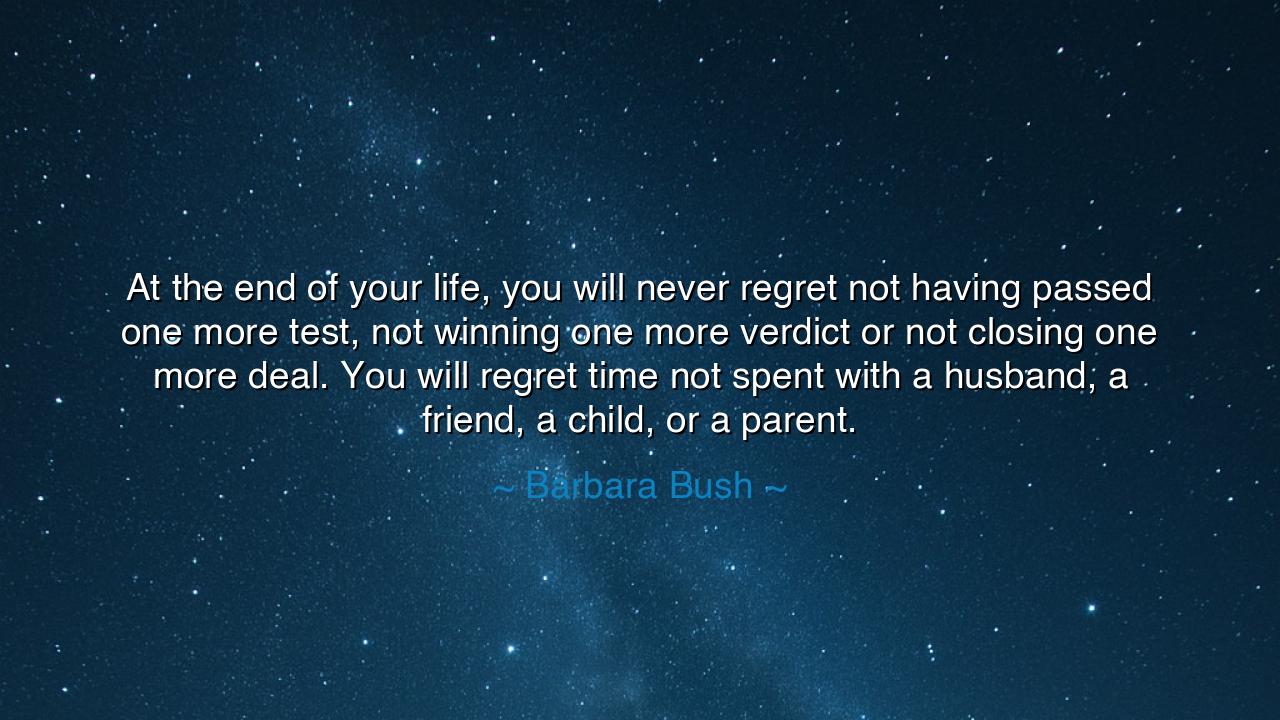
At the end of your life, you will never regret not having passed
At the end of your life, you will never regret not having passed one more test, not winning one more verdict or not closing one more deal. You will regret time not spent with a husband, a friend, a child, or a parent.






The words of Barbara Bush—“At the end of your life, you will never regret not having passed one more test, not winning one more verdict or not closing one more deal. You will regret time not spent with a husband, a friend, a child, or a parent”—fall upon the heart like a solemn bell at dusk. They are not the fleeting musings of ambition but the distilled wisdom of a life well-lived, a truth gathered from watching power and prestige fade while love endured. Her voice pierces through the illusions of success, reminding us that when the final day comes, the trophies of the world turn to dust, but the warmth of relationships remains a treasure beyond measure.
The origin of this teaching lies in the life of Barbara Bush herself, who as First Lady and mother of a president walked in the very halls of worldly power. She saw both the glittering prizes of ambition and the hidden cost of neglecting family. From such a vantage, she spoke not as one who scorned success, but as one who knew its limits. Her words echo an ancient truth: the affairs of the marketplace, the victories of the courtroom, the triumphs of the classroom—all these are fleeting. But the love of family and the bond of friendship are eternal riches that remain when all else fades.
The ancients, too, spoke this wisdom. Consider the mighty Emperor Marcus Aurelius, master of Rome, who commanded legions and ruled an empire. In his Meditations, he wrote not of conquest but of the brevity of life, the importance of virtue, and the value of those closest to him. Power could not shield him from death, nor could fame accompany him to the grave. What endured were the simple acts of love, the moments shared with others, the inner harmony of a soul that cherished what truly mattered. Barbara Bush’s words are but the modern echo of this timeless philosophy.
Think also of the industrial titan Andrew Carnegie, who amassed wealth beyond measure. Near the end of his life, he confessed regret that he had not spent more time with those dearest to him, having pursued fortune so relentlessly. His riches built libraries and foundations, yet even he could not escape the sorrow of missed hours with family. The wisdom of Barbara Bush shines here: no test, no verdict, no deal can substitute for the tender presence of a loved one.
Her words also carry a warning to every generation intoxicated by speed, ambition, and achievement. The world urges us to climb higher, to win more, to prove ourselves. But the heart, when silenced long enough to listen, whispers another truth: it longs not for applause, but for companionship. It is not in the noise of achievement that the soul finds peace, but in the quiet laughter of a child, the embrace of a partner, the steadfast presence of a parent or a friend.
The lesson is radiant: guard your time, for it is the most precious coin you possess. Do not spend it all on the pursuit of worldly gain, lest you find your hands full of gold but your heart empty of love. Let your calendar hold not only appointments of labor but appointments of love. Visit your parents, play with your children, break bread with your friends, and walk beside your spouse. These are the true investments of life, yielding a harvest that death itself cannot steal.
Practically, let each soul resolve to reorder their days. Ask yourself each morning: “Am I giving my best hours to what truly matters?” Carve out time for those you love, for their presence is the truest measure of wealth. Let ambition serve love, not replace it. For in the end, as Barbara Bush reminds us, regret will not come from the work we left undone, but from the love we failed to give.
Thus, her words stand as a torch to light our path: success may bring applause, but love brings eternity. When life draws its final breath, the memory of laughter around the table, the touch of a hand held in sorrow, the smile of one who walked beside us—these will be the treasures we carry. Choose them now, so that at the end, you may say not “I regret,” but “I cherished well.”






AAdministratorAdministrator
Welcome, honored guests. Please leave a comment, we will respond soon